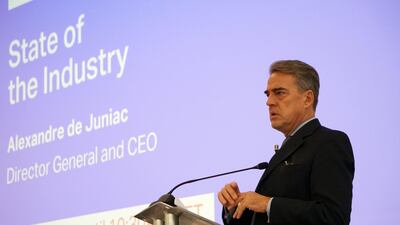The chief of the International Air Transport Association voiced concerns over the continued delays to the comeback of Boeing's 737 Max, but said it could be an advantage for airlines if they reined in overcapacity.
Alexandre de Juniac, director general of Iata, said the latest delays to the plane’s return to commercial service meant airlines are adversely affected because of cancelled flights but the reduction in capacity could help improve yields.
"It's delayed by one month every month," he said on Thursday. "The negative effect is obvious. You are grounded, can't sell flights etc, but the positive is you can use capacity."
The chief of Iata, a body which represents more than 290 airlines globally, was speaking after the Federal Aviation Administration said it will not complete the necessary approvals for the jet's return until 2020. The US aviation regulator's position means another deadline delay for the 737 Max to resume flying. The best-selling narrow-body jet has been grounded for nine months after it was involved in two crashes that killed 346 people.
Iata in its annual forecast expressed concern that the Max's return next year would mean a surge of aircraft deliveries entering the market quickly, creating a glut of additional capacity that could be difficult to absorb in the market.
Iata is holding its annual media gathering in Geneva this week as it reveals its latest yearly forecast on the aviation industry’s profitability and performance.
Airlines in the Middle East are forecast to post a loss of $1 billion (Dh3.67bn) in 2020, trimmed from $1.5bn this year, according to Iata's report. The improved outlook comes as Gulf airlines restructure operations and reshape their fleet plans, entering into an era of normalised growth after two decades of double-digit expansion.
"The gulf carriers are entering into normal waters after an incredible period of accelerated growth," Mr de Juniac said. "They are moving to something which is more classical: it means you have to deal with restructure, reshuffle your programme, your fleet – what the others are facing for years because the market is more mature. It's more of a normalisation."
Gulf airlines redefined the aviation map around their "super-connector" hubs but that model is increasingly under pressure as the massive growth for the region’s biggest airlines slows down.
The Iata chief said the model is being challenged by the development of direct ultra-long haul flights such as Qantas' planned 20-hour service between Sydney and London as well as the spread of long-haul low-cost operations.
But according to Mr de Juniac, the super-connector model is here to stay despite challenges from new models of operating.
“We do not see the super-connector model disappear, it will continue.”
__________________


